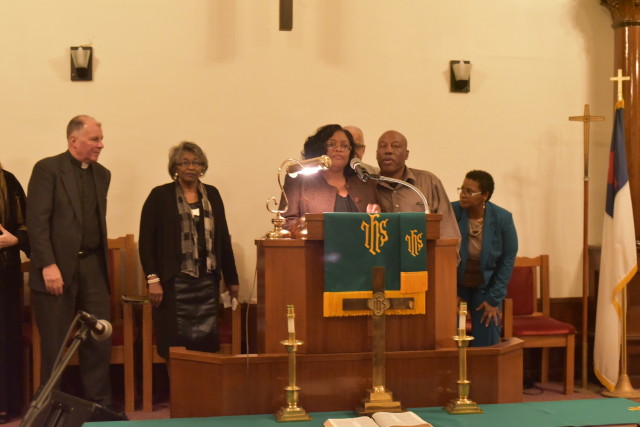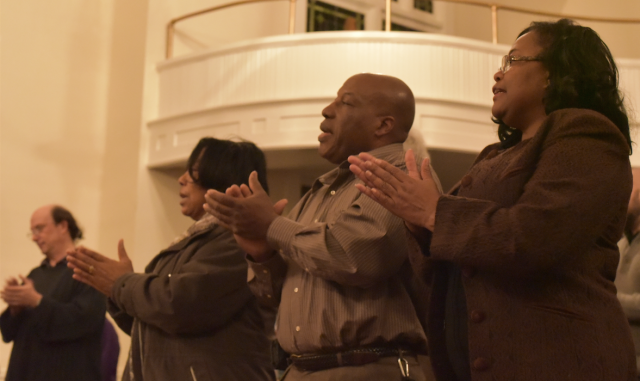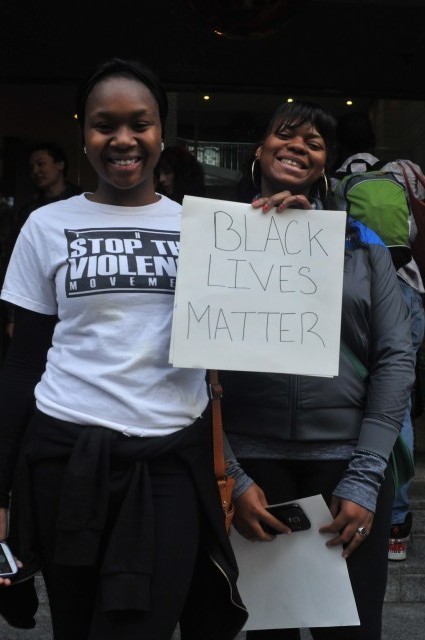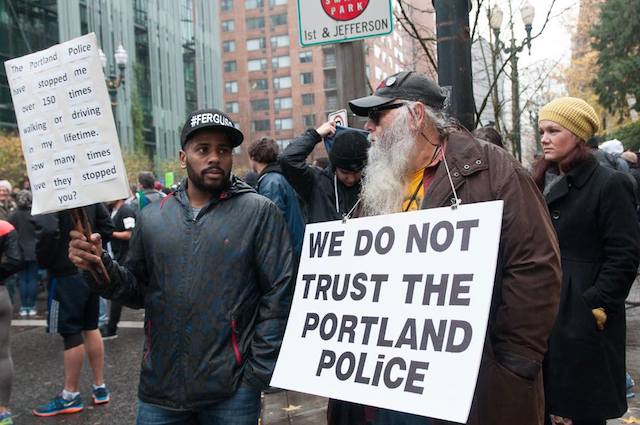
Photo by Pete Shaw
A vigil attended by over 50 people was held on January 29 at the AME Zion Church on North Vancouver Avenue to remember Aaron Campbell, the young Black man killed exactly six years earlier by Portland Police Officer Ron Frashour. A further significant aspect of the event was the opportunity to reflect upon Campbell’s death in context to the struggle for Black liberation and police accountability.
On January 29, 2010, Campbell, 25, whose younger brother had died earlier in the day, was in an apartment in Northeast Portland, distressed and possibly suicidal, and, according to his aunt, in possession of a gun. Police responded by surrounding the apartment and it soon appeared that Officer James Quackenbush had defused the situation. Campbell emerged, unarmed, with his hands behind his head. Due to an apparent lack of communication, one officer fired six beanbag rounds at Campbell, who then began to run away from the officers. A police dog was released to attack Campbell, followed by Frashour shooting Campbell in the back with his AR-15 rifle.
“We’re here because of a great injustice that has taken place in our city some 6 years ago,” said Dr. Reverend Leroy Haynes of the Albina Ministerial Alliance (AMA). “We’re here to say that we will not allow injustice by those who have been given authority to patrol our streets. We’re here to say Black lives matter. We’re here to say that Aaron Campbell mattered. We’re here to say that this life was not a life in vain.”
It is difficult to describe the kind of strength it must take for a person like Haynes, who began working for Black people’s liberation (and all people’s liberation for that matter) at the age of 13, during the Civil Rights Movement. Haynes, who “went to jail week after week to break down the doors of Jim Crow segregation,” has the perspective that comes from a long lifetime deeply involved in a struggle that preceded him and will likely continue beyond his allotted years on earth. For Haynes, Campbell’s life represents not just a moment–it is part of a continuum he is working to change–work that will only be finished “when we have that free, just, and equal society.”

Marva Campbell Davis, right, at the vigil for her son Aaron Campbell. Photo by Pete Shaw.
If putting Haynes’ fortitude into words is difficult, it is borderline impossible to describe Campbell’s mother, Marva Campbell Davis, who along with six members of her family came from California to attend the vigil.
“This is so important,” she said, “and so many people don’t realize that this could happen to their child, and I would hate for anybody to have to go through this.”
Davis talked about how one year prior to her son’s murder he had gotten into a fight with another young man. A gun was supposedly involved, and the police placed the blame on Aaron Campbell. Davis said the police showed up at her house, tried to plant evidence, and threatened to tear apart the house searching for this evidence if Aaron did not plead guilty. Campbell did not bend and demanded a trial, resulting in him being found not guilty.
“We’re supposed to trust them (the police),” said Davis. “But all they do is lie. They’re liars.”
Davis then emphasized the need to change the laws that allow police to kill with impunity. That call was echoed by Jo Ann Hardesty, President of the Portland Chapter of the NAACP, who noted that during this 2016 election year the major mayoral candidates are parroting the Portland Police Bureau’s insistence that Portland needs more police. (Mayor Charlie Hales, who came into office vowing to reform the Portland Police Bureau (PPB), so far appears to have done little more than kowtow to it.)
“What we need,” Hardesty told the crowd, “is a different caliber of police officer.” She presented common sense steps toward that end, particularly insisting that police be “part of the communities they serve, live in the communities they serve, go to the same grocery stores we go to, go to the same houses of worship we go to.”

Photo by Pete Shaw
At this point it should be clear that any reforms, much less an overhaul of the PPB, will not come easy. It has been over three years since the Department of Justice (DoJ) issued a report finding PPB guilty of using excessive violence against people experiencing or appearing to experience mental crises. The DoJ investigation was spurred on by the calls of the AMA Coalition for Justice and Police Reform–formed soon after Campbell’s murder–to look into the PPB’s violent tendencies toward people and communities of color. Though the report spent a few pages noting the poor relationship between Portland police and communities of color, the DoJ ultimately punted on that issue, instead choosing to focus on the PPB’s treatment of people dealing with mental duress and illness.
After some wrangling over the content of the settlement agreement offered in lieu of a lawsuit–including a requirement that the PPB file annual progress reports (a move resisted by City Council)–there now exists some framework for reform. That framework is apparently not enough for the AMA Coalition which in July put forth five goals it will work toward, goals that extend beyond the scope of the settlement agreement.
The AMA’s goals seem necessary in light of the fact that, as Hardesty pointed out, Mayor Hales appears to have “turned reform of the PPB over to the PPB”. A glaring example of this was the allowed reinstatement Mark Kruger, the officer who saw fit to erect a shrine to Nazis at Rocky Butte Park. Meanwhile, the Community Oversight Advisory Board, created as part of the settlement agreement, has allowed police officers a seat at the table, virtually guaranteeing its ultimate bias. And in late December, the Oregon Court of Appeals upheld an Oregon Employment Relations Board arbitrator’s decision that Frashour acted in accordance with his training, and he has now rejoined the force.
To all appearances there is little evidence that those in power have either the will or desire to change the system, a system that Hardesty noted “does not want us to survive.”
Haynes said that this work constitutes “a movement is not marathon”, a point buttressed by Adrienne Cabouet of Black Lives Matter. Noting that “some experiences are unique to Black folks…the pain, the hollow feeling of lostness every time a cop kills someone,” Cabouet underscored the bedrock fallacy of the insipid “all lives matter” rejoinder to Black lives matter. Yes, Black people are not the only ones murdered by police; however, the rate at which they are gunned down–one Black person is killed by police or vigilantes every 28 hours–and the mostly inconsequential handwringing that follows, makes it quite clear that Black lives do not matter.
“It’s not an accident,” said Cabouet, “that police kill us and get away with it.”

Photo by Bette Lee
Also not an accident, Cabouet told the audience, is the fact that Black communities have persevered. “You are the result of hundreds of years of resistance. Considering what’s been done to us, we should not even be here.”
That resistance has been most prominent at various times in history, most recently in the year and a half since Michael Brown was killed by Ferguson, Missouri, police officer Darren Wilson. The issue has been taken up, if not wholeheartedly, by all the Democratic Party candidates for president, and there has been a general swelling in the number of people whose trust in police has waned.
Where will this resistance lead? The idea of reforming police goes hand in hand with the idea of tossing the bad apple, a vision that ignores the reality of the rotten barrel. Committing violence against people, particularly those who might organize and rise up against the capitalist system that oppresses them, is the primary function of police, and that oppression is most often aimed at people of color, particularly Black people. No amount of reform will bring back Aaron Campbell and the numerous others police have murdered, nor is it likely to result in true justice for them, their families, and their communities. As long as the capitalist system–whose existence largely depends upon police violence–persists, meaningful change is certain to remain elusive.
“The only way to stop this,” said Cabouet, “is to tear it down and make something better.”







3 comments for “Aaron Campbell’s Death: Six Years on from the Turning Point for Portland Police Accountability”